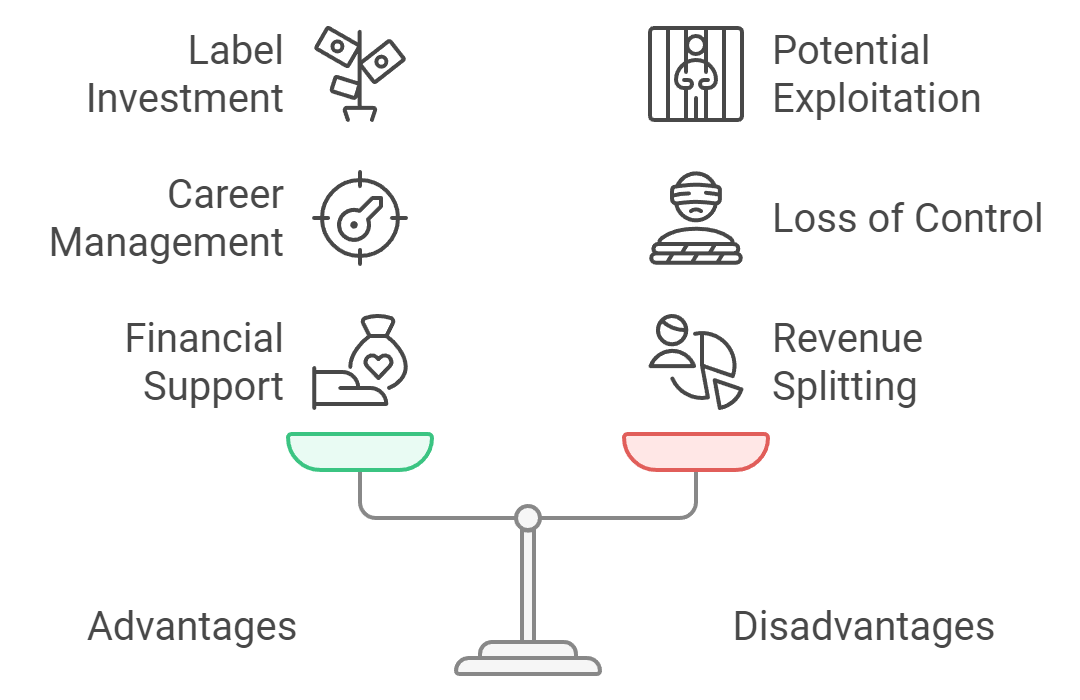360 Deal
A 360 deal is a contract in the entertainment industry that allows a label or management company to claim a percentage of an artist’s earnings from various sources, such as music sales, tours, merchandise, and endorsements.
What is a 360 Deal?
A 360 deal is a comprehensive contract in the entertainment industry, commonly used in the music business. Under a 360 deal, a record label or management company agrees to provide financial investment and career development for an artist in exchange for a percentage of the artist’s revenue streams. These streams typically include album sales, live performances, merchandise, endorsements, and other income sources beyond just music recordings.
Key Features of a 360 Deal
Revenue Streams Covered: In contrast to traditional contracts, which may focus only on album sales or streaming royalties, 360 deals grant the label or management a share of revenue from multiple income sources. This can include:
- Live performances and tours
- Merchandising (e.g., clothing, posters, branded items)
- Endorsements and sponsorships
- Licensing deals (for music in movies, commercials, video games)
- Any other business ventures tied to the artist’s brand
Revenue Sharing: The artist shares a percentage of their earnings with the label. In return, the label typically offers higher financial investment, such as greater promotional budgets and tour support, with the goal of creating a broader career.
Control and Management: 360 deals often give the label or management company more control over the artist’s career decisions, including creative choices, business partnerships, and brand strategy.



The pros & cons of a 360 deal.
Example
In a traditional record deal, an artist might only share profits from their album sales with a record label. However, in a 360 deal, the label would receive a percentage of the artist’s income from touring, merchandise sales, and even product endorsements.
Advantages and Disadvantages of a 360 Deal
Advantages
- Financial Support: The artist benefits from the label’s investment in multiple aspects of their career. This may include funds for touring, merchandising, and broader career development.
- Broader Career Management: The label or management company typically provides guidance and resources for all aspects of the artist’s brand, helping them grow beyond just their music career.
Disadvantages
- Loss of Control: Artists often give up significant creative and financial control. The label might have a say in decisions about tours, endorsements, or even creative direction, reducing the artist’s autonomy.
- Revenue Splitting: While the label invests in the artist’s overall career, the artist must share a portion of all revenue streams, even those that might not have traditionally been part of a record deal. This can lead to artists earning less from sources like merchandise or live shows.
- Potential Exploitation: Some critics argue that 360 deals disproportionately favor the label, especially if the label fails to live up to its end of the agreement in promoting the artist effectively.
Common Questions
What is a 360 contract in music?
A 360 deal is a contract where a record label or management company provides financial backing and career development for an artist in exchange for a share of all revenue streams, including album sales, touring, merchandise, and endorsements.
How does a 360 deal differ from a standard record contract?
A standard record contract typically only covers income from recorded music (like album sales or streaming). A 360 deal, however, includes additional income streams like live performances, merchandise, and endorsements, giving the label a broader financial interest in the artist’s entire career.
Why do artists sign 360 deals?
Artists may sign 360 deals because they offer financial investment in their career beyond just music. Labels often provide promotional support, tour funding, and broader career management, which can be appealing to newer or emerging artists who need resources to grow their brand.
Conclusion
The 360 deal is a modern approach to artist-label relationships that gives the label a stake in various aspects of an artist’s career, from music sales to merchandising and beyond. While these deals offer substantial support and investment from the label, they are often controversial due to the control and financial commitments they impose on artists. For emerging artists, 360 deals may be an appealing way to secure financial backing, but they require careful consideration due to the potential long-term implications on income and autonomy.
Contracts can be enjoyable. Get started with fynk today.
Companies using fynk's contract management software get work done faster than ever before. Ready to give valuable time back to your team?
Schedule demo

